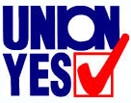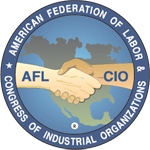In 2013 the total number of workers in unions rose by 162,000 compared with 2012, led by an increase of 281,000 workers in private-sector unions. There were strong gains in construction and manufacturing, against a background of strike actions by low-wage workers in the private sector. But destructive, politically motivated layoffs of public-sector workers continued to hurt overall public-sector union membership, leaving the total percentage of the workforce that is unionized virtually unchanged.
“Wall Street’s Great Recession cost millions of America’s workers their jobs and pushed already depressed wages down even further. But in 2013, America’s workers pushed back,” AFL-CIO President Richard Trumka said of the figures released Friday by the Department of Labor. “At the same time, these numbers show that as unorganized workers have taken up the fight for their right to a voice on the job, union employers are hiring—creating good jobs our economy desperately needs.”
Despite the overall gains of 2013, workers in the public sector continued to bear the brunt of the continuing economic crisis, weak labor laws and political assaults on their rights on the job. In Wisconsin, political attacks on public-sector workers’ right to collectively bargain resulted in bargaining coverage falling. Broadly, federal, state and local governments continued to lay off needed public workers, leading to an overall loss of 118,000 union members.
“Make no mistake, the job of rebuilding workers’ bargaining power and raising wages for the 99% has a long way to go,” said Trumka. “Collective action among working people remains the strongest, best force for economic justice in America. We’re building a stronger, more innovative movement to give voice to the values that built this country. From Walmart workers to fast food workers to homecare workers, the rising up of workers’ voices against inequality – both inside and outside of traditional structures – is the story of 2013.”
Key trends include:
- The total number of private-sector union members rose by 281,000, while the total number of public-sector union members fell by about 118,000. There are now more private-sector union members than public-sector members.
- Industries with the biggest growth include construction (up 95,000), hospitals and Transportation Equipment Manufacturing
- Sectors hit hardest include social assistance and administration and support services.
- Union membership rates did not change in any meaningful way by gender: 10.5 percent of women and 11.9 percent of men were in unions.
- States with the largest union membership rate growth include: Alabama (1.5 percentage points), Nebraska (1.3 points), Tennessee (1.3 points), Kentucky, (1.2 points), New York (1.2 points), Illinois (1.2 points) and Wisconsin (1.1 points).
- States with the largest union membership rate declines include: Louisiana (-1.9 percentage points), Oregon (-1.8 points), Utah (-1.3 points), Wyoming (-1.0 points) New Hampshire (-0.9 points), Montana (-0.9 points) and Texas (-0.9 points).
 After Volkswagen issued a letter in September saying the company would not oppose an attempt by the United Auto Workers (UAW) to unionize its 1,600-worker Chattanooga, Tenn., facility, Sen. Bob Corker (R-Tenn.) was flabbergasted.
After Volkswagen issued a letter in September saying the company would not oppose an attempt by the United Auto Workers (UAW) to unionize its 1,600-worker Chattanooga, Tenn., facility, Sen. Bob Corker (R-Tenn.) was flabbergasted. SMART Transportation Division President Mike Futhey and Assistant President John Previsich this week joined the leaders of other AFL-CIO affiliate unions at the organization’s annual winter meeting.
SMART Transportation Division President Mike Futhey and Assistant President John Previsich this week joined the leaders of other AFL-CIO affiliate unions at the organization’s annual winter meeting.